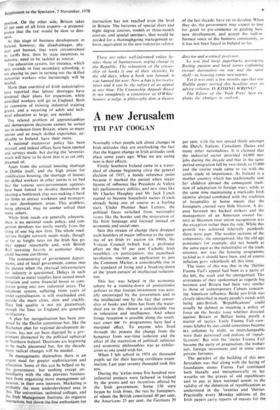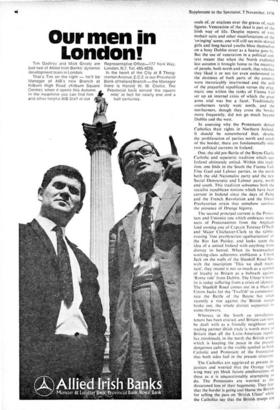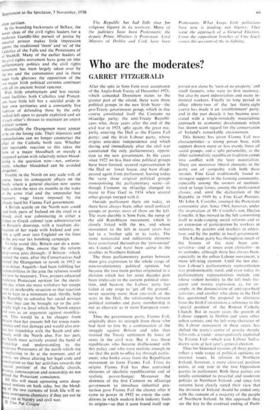A new Jerusalem
TIM PAT COOGAN
Normally when people talk about changes in Irish attitudes they are overlooking the fact that the biggest change in Irish attitudes took place some years ago. What we are seeing now-is their effects.
Firstly Southern Ireland came to a water- shed of change beginning circa the general
election of 1957. a handy reference point because it marked the period when major figures of influence like President de Valera left parliamentary politics, and new ones like Mr Charles Haughey and Mr Jack Lynch started to become household names (Lynch already being one of course as a hurling star). Under Premier Sean Lemass. the political focus switched from nationalist issues like the border and the restoration of the Irish language and focused instead on economic and social ones.
Into this stream of change there dropped such boulders of major influence as the open- ing of an Irish Tv station (in 1960). the Vatican Council (which had a profound effect on the 95 per cent Cattiolic Irish
republic). UN participation, the paperback
revolution, tourism, an application to join the Common Market, a considerable rise in the standard of living and a breaking-down of the 'green curtain' of intellectual isolation- ism.
This last was helped in the economic sphere by a running-down of protectionist policies so that foreign investment was actu- ally encouraged by the government and in the intellectual one by the fact that censor- ship of books and films has from the water- shed era to this shown a considerable rise in toleration and intelligence. And where fringe reception is possible along the south-
east coast BBC Tv programmes have had a marginal effect. To anyone who lived through the process the change from the hangover from war-time isolation and the effect of the stagnation of political, religious and economic philosophies was as exhilar- ating as one could wish for.
When I left school in 1954 six thousand pupils sat for their leaving certificate exam- ination. Last year seventy thousand took this test.
During the 'sixties some five hundred new industrial projects were fathered in Ireland by the grants and tax incentives offered by the Irish government. Some 150 were begun by Irish firms, the rest by foreigners. of whom the British constituted 40 per cent. the Americans 25 per cent, the Germans 20
per cent, with the rest spread thinly amongst the Dutch, Italians, Canadians. Danes and many other nationalities. It is claimed that the industrial sector provided 44.000 new jobs during the decade and that in the same period emigration fell by two-thirds to 15,000 and the tourist trade came to vie with the cattle trade in importance. As Ireland is a mother country which has traditionally sent her children abroad the consequent tradi- tion of adaptation to foreign ways. while at the same time maintaining a markedly Irish identity abroad combined with the tradition of hospitality at home meant that the foreigners created very little friction. A dis- pute between IRA backed strikers and the management of an American owned fac- tory at Shannon over union recognition was the exception rather than the rule. While this growth was achieved relatively painlessly there were gaps. The weaker sections of the community, the unorganised. like the old age pensioners for example, did not benefit at the same pace as the industrialist or the trade unionist, nor was the housing programme tackled as it should have been, and of course inflation grew relentlessly all this time.
The irony of this was that in the 'thirties Fianna Fail's appeal had been as a party of the left, the weak and the unorganised. The utterances of their spokesman as regards big business and Britain had been very similar to those of contemporary Cubans concern- ing American influence. Being pro-Irish was closely identified in many people's minds with being anti-British. 'Republicanism' could usually be defined as meaning a policy of force on the border issue whether directed against Britain or Belfast being purely a matter of tactics. Early Fianna Fail turn- mans (clubs) by day could sometimes become ma columns by night, so interchangeable were their personnel and notions of 'repub- licanism'. But with the 'sixties Fianna Fail became the party of pragmatism, the mohair suit, foreign investment and in some cases private fortunes.
The paradox of the building of this new Jerusalem was that along with the laying of foundation stones Fianna Fail continued both literally and metaphorically to lay wreaths on the graves of old republicans and to pay at least notional assent to the validity of the definition of republicanism as understood in the 'twenties and 'thirties. Practically every Monday editions of the Irish papers carry reports of masses for the souls of, or orations over the graves of, such figures. Veneration of the dead is part of the Irish way of life. Despite reports of Lsn, mohair suits and other manifestations of the 'swinging' scene, one will still see mini-skirted girls and long-haired youths bless themselves on a busy Dublin street as a hearse goes by. But the use of veneration in a political con- text meant that when the North exploded last autumn it brought home to the majority of people, both north and south, that whether they liked it or not (or even understood it) the destinies of both parts of the country were inextricably intertwined and the pull of the prayerful republican versus the prag- matic one within the ranks of Fianna Fail set up an internal crisis of which the great arms trial was but a facet. Traditionally southerners rarely went north, and the northerners, though they cross the border more frequently, did not go much beyond Dublin and the west.
In assessing why the Protestants denied Catholics their rights in Northern Ireland, it should be remembered that, despite the proliferation of parties north and south of the border, there are fundamentally only two political currents in Ireland.
One, the old pre-Battle of the Boyne Gaelic Catholic and separatist tradition which sees Ireland ultimately united. Within this tradi- tion, one fidds in the South the Fianna Fail, Fine Gael and Labour parties, in the north both the old Nationalist party and the new Social Democratic and Labour party, north and south. This tradition subsumes both the socialist republican notions which have been current in Ireland since the days of Paine and the French Revolution and the liberal Presbyterian strain that somehow survives the presence cif Orange bigotry.
The second principal current is the Protes- tant and Unionist one which embraces many sects of Protestantism from the Anglican land owning one of Captain Terence O'Neill and Major Chichester-Clark to the rabble- rousing 'free presbyterian /egalitarianism' of the Rev Ian Paisley, and looks upon the idea of a united Ireland with anything from dismay to hatred. When its brainwashed working-class adherents emblazon a Union Jack on the walls of the Shankill Road fiats with the inscription 'This we shall main- tain', they intend it not so much as a symbol of loyalty to Britain as a bulwark against 'Rome rule' from Dublin. The Ulster Union- ist is today suffering from a crisis of identity. The Shankill Road comes out in a blaze of Union Jacks for the 'Twelfth' to commemo- rate the Battle of the Boyne but ‘■hen recently a riot against the British troops broke out, the whole district supported its stone-throwers.
Whereas in the South an unwelcome tenant has been evicted. and Britain can now be dealt with as a friendly neighbour and trading partner (Irish trade is worth more to Britain than all the Latin-American repub- lics combined), in the north the British army which is keeping the peace in the present dangerous calm is the visible symbol to both Catholic and Protestant of the frustration that both sides feel in the present situation.
The Catholics are aggrieved at present in- justices and worried that the Orange right wing may yet block future ameliorations of these as it is unquestionably attempting to do. The Protestants are worried at the threatened loss of their hegemony. They fear that the border is going and blame the British for selling the pass on 'British Ulster' while the Catholics say that the British troops are often partisan. In the brooding backstreets of Belfast, the newer ideas of the civil rights leaders for a moderate Gandhi-like pursuit • of justice by peaceful protest makes little impression against the traditional 'them' and 'us' of-the Catholics of the Falls and the Protestants of of Shankill. Many of the earlier leaders of the civil rights movement have gone on into parliamentary politics and the civil rights movement has been largely taken over by the IRA and the communists and in those mean little ghettoes the opposition of the two major Irish political currents continues oith all its ancient brutal rancour.
With little employment and less recrea- tional facilities both Catholics and Protest- ants have little left but a suicidal pride in their own territories and a constantly live tradition of defending these by the only method left open to people exploited and set at each other's throats to maintain an unjust political system.
Historically the Orangemen must appear to be on the losing side. Their injustices and manipulations can no longer counteract the effect of the Catholic birth rate. Whether their inevitable reaction to this takes the form of a major bloodbath or merely a rearguard action with relatively minor blood- letting is the question now—not, unfortu- nately, whether bloodshed can be avoided altogether.
Trouble in the North on any scale will, of course, have its consequent effects on the South, where a general election now seems likely within the next six months in the wake of the arms trial and the unpopular but necessary wage freeze imposed by the already hard-hit Fianna Fail government.
A British scuttle on the North now could send both parts of Ireland on the road to a hloody civil war culminating in either a Cuban or Greek colonel type administration on Britain's doorstep, with a resultant dis- location of her trade with Ireland and pos- sibly a spill over into England on the lines of the pre-war IRA bombing campaign.
To help avoid this, Britain can do a num- ber of things. One, ensure that the reform programme goes through: if Britain—which created the state, after the Conservatives had incited the Orangemen to revolt in 1912 so as to defeat Asquith—had been fulfilling her responsibilities in the area the reforms would not now be necessary. Two, prepare educated moderate Protestant opinion for the inevit-
hle day when she must withdraw her troops from an intolerable situation so that reaction
an be kept to a minimum and, thirdly, help he Republic to subsidise her social services 0 that they can be brought up to the arti- clay high UK level which the North enjoys nd uses as an argument against reunifica- on. This would be a lot cheaper from ritain than her present bill for troop main- enance and riot damage and would also pro- m her friendship with the South and ulti-
ately with the North also. For her part, he South must actively extend the hand of riendship and understanding to the oderate Protestants of the north which she
neglecting to do at the moment, and of ourse, see about altering her legal code and onstitution so that her activities towards the special position' of the Catholic church,
irvorce, contraception and censorship do not end the Protestant conscience. All this will mean uprooting some deep-
notions on both sides, but the blend- grof the two currents of Irish life will re- ue courageous chemistry if they are not to urst out in bigotry and civil war. V., Tim Pat Coogar
The Republic has had little time for religious bigotry in its territory. Many of the judiciary have been Protestants: the deputy Prime Minister is Protestant. Lord Mayors of Dublin and Cork have been
Protestants. What keeps Irish politicians busy now is feuding. not bigotry. They scent the approach of a General Election. From the opposition- benches of Fine Gael. comes this account of the in-fighting.
























































 Previous page
Previous page